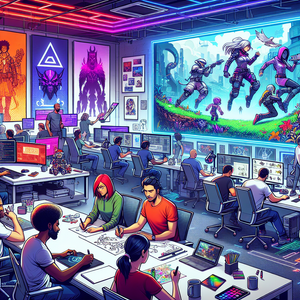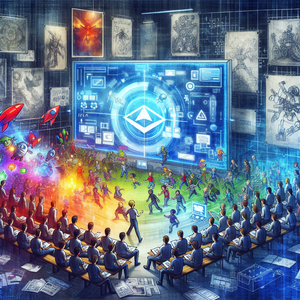
Exploring Exciting Careers in the Thriving Video Game Industry: Key Roles and Skills You Should Know
As the video game industry continues to explode into a multi-billion-dollar phenomenon, it offers an impressive range of career opportunities that cater to a variety of skills and interests. From imaginative roles like game design and animation to essential technical positions such as programming and quality assurance, the landscape is not only rich but also continually evolving. Recent analyses reveal that while many roles demand specialized skills, there are plenty of entry-level positions available that don’t require coding or artistic expertise. Fields such as production, marketing, and community management provide pathways for individuals from diverse backgrounds to enter this vibrant industry.
Job Summaries:
Game Designer:
- Game designers serve as the creative architects behind a game’s concepts and mechanics.
- They are responsible for developing engaging storylines, characters, and gameplay.
- Daily tasks involve brainstorming sessions, prototype creation, and collaboration with artists and programmers.
- A bachelor’s degree in game design or a related field is typically required, along with proficiency in design software and a strong portfolio.
- With the frequency of game releases on the rise, this is an opportune time to seek openings for game designers.
Video Game Programmer:
- Individuals write the code that brings games to life.
- Collaborating closely with designers and artists.
- Implementing gameplay features and optimizing performance across various platforms.
- Key tasks include debugging, optimizing code, and developing tools for team use.
- Generally, a degree in computer science or software engineering is required.
- Expertise in languages like C++ and C# is required.
- This role is fundamental to creating seamless gaming experiences.
- Reflects the industry's technical demands.
Game Animator:
- Game animators breathe life into characters and environments through animation.
- They design movement sequences to ensure that animations align with the game’s overall aesthetic.
- A solid understanding of 3D modeling software and animation principles is essential, as is a portfolio showcasing prior work.
- A degree in animation or a related field is often preferred.
- Their artistry significantly enhances the visual storytelling of games, impacting player immersion.
Quality Assurance (QA) Tester:
- QA testers play a crucial role in ensuring games are free from bugs and glitches before their release.
- They thoroughly play through games to identify issues, providing feedback to developers.
- This position requires a keen eye for detail and strong analytical skills, along with gaming experience to understand player expectations.
- While specific degrees may not be necessary, familiarity with testing methodologies is advantageous.
Game Producer:
- Game producers oversee the entire development process.
- Managing teams and ensuring that projects stay on track and within budget.
- Facilitating communication between departments.
- Handling project timelines.
- A background in project management and strong organizational skills are essential.
- Degrees in business, project management, or game design are common among producers.
- Producers' leadership is vital for successful game launches.
Community Manager:
- Community managers act as the bridge between players and developers, fostering engagement and managing feedback.
- Duties include social media outreach, event organization, and addressing customer inquiries.
- Strong communication skills and a passion for gaming are crucial.
- Experience in community management or marketing is important.
- This role is essential for building a loyal player base.
Game Writer:
- Game writers create the narratives and dialogues that shape player experiences.
- They develop character backstories, plotlines, and in-game dialogues to ensure a cohesive story.
- A degree in creative writing, literature, or a related field is often required, along with a portfolio of previous work.
- Skilled writers are vital for immersive storytelling in games, enhancing player engagement.
Audio Engineer:
- Audio engineers are responsible for crafting sound effects, music, and voiceovers in video games.
- They work closely with developers to ensure the audio experience aligns with the game’s mood.
- A degree in audio engineering or music production is typically needed.
- Their expertise significantly enriches the overall gaming experience.
User Experience (UX) Designer:
- UX designers focus on optimizing player interactions with games to ensure they are intuitive and enjoyable.
- They conduct user research, design interfaces, and test gameplay mechanics.
- A background in design or psychology and experience in UX principles are often required.
- This role is instrumental in creating user-friendly gaming experiences.
Digital Marketing Specialist:
- Digital marketing specialists promote video games through various online channels.
- Their responsibilities include creating marketing campaigns, managing social media, and analyzing market trends.
- A degree in marketing or communications is typically required, along with experience in digital marketing tools.
- Their efforts are vital in reaching target audiences and driving game sales.
Game Localization Specialist:
- Game localization specialists adapt games for different languages and cultures.
- They ensure content is appropriate for global audiences.
- They translate scripts and adjust cultural references.
- A background in language studies or translation is often required.
- Familiarity with gaming culture is important.
Esports Manager:
- Esports managers oversee competitive gaming events.
- They coordinate team management and event logistics.
- A background in sports management or event planning is beneficial.
- Experience in the gaming sector is important.
Game Marketing Executive:
- Game marketing executives develop strategies to promote video games and boost sales.
- They analyze market trends and coordinate advertising efforts.
- A degree in marketing or business, along with gaming industry experience, is often required.
Game Tester:
- Game testers play through video games to identify bugs and gameplay issues before launch.
- They document findings and provide feedback to developers.
- Attention to detail and a passion for gaming are essential for this role.
Level Designer:
- Level designers create the environments and challenges within games.
- They focus on gameplay flow and player engagement.
- Using design software to build levels in collaboration with programmers and artists.
Visual Effects (VFX) Artist:
- VFX artists create visual effects that enhance the realism and excitement of video games.
- They work on dynamic visuals and collaborate with animators and designers.
- A degree in visual effects or animation is typically required.
Game Compliance Tester:
- Game compliance testers ensure that games meet legal and regulatory standards.
- They review content and functionality to ensure adherence to industry guidelines.
- Attention to detail and an understanding of gaming regulations are essential.
As you explore these job summaries, you'll gain insight into the diverse opportunities available within the gaming industry. Whether you’re drawn to creative, technical, or managerial roles, there’s a place for you in this dynamic field. With the industry poised for further growth and innovation, now is the perfect time to embark on your gaming career journey. Check current job listings to find the right opportunity for you!
Explore More Jobs
